Recent Articles
Popular Makes
Body Types
2017 Ford Focus vs 2017 Toyota Corolla: Which is Best?
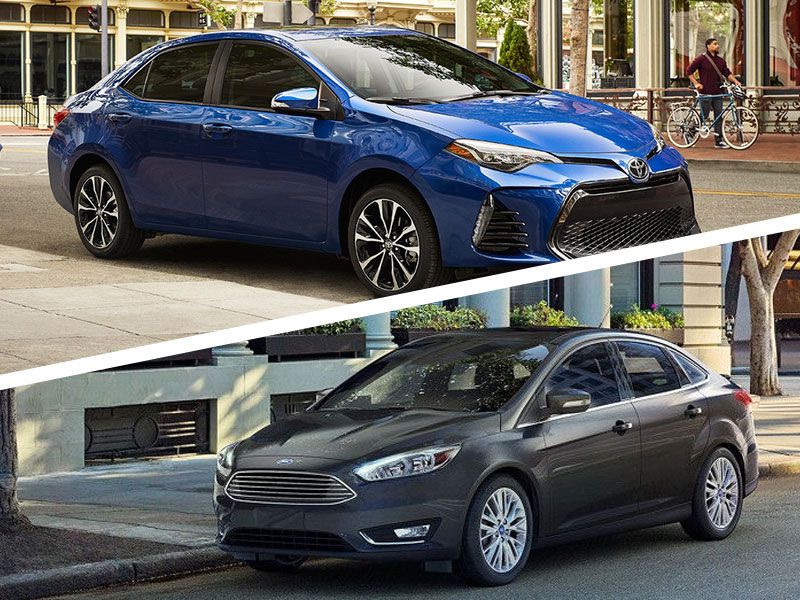
2017 Toyota Corolla vs 2017 Ford Focus exterior ・ Photo by Ford / Toyota
Choosing between the 2017 Ford Focus and 2017 Toyota Corolla is deceptively tricky. It’s not as easy as saying, “the Focus is more fun and therefore the winner.” While that fun aspect is certainly true, there are other factors to take into consideration. These include the age of each car’s generation, safety equipment, and resale values.
Of course, if a buyer was only interested in a hatchback, then it’s Focus all the way. Similarly, there are high-performance Focus variants and an all-electric model for which there are no Corolla equivalents. But let’s work on the premise that a compact sedan may also be considered, with an efficient (but not super-powerful) combustion engine. In which case, read on.
Focus vs. Corolla: Pricing and Trim Levels
The 2017 Ford Focus sedan starts at $17,650 for the sedan in basic S trim (which has 15-inch steel wheels, but also a rearview camera). The price then goes up to $19,050 for the SE (sedan or hatchback, now we’re getting into 16-inch alloy wheels), $22,050 for the SEL and $24,450 for the bells-and-whistles Titanium trim. (We’re deliberately omitting the ST, RS, and Electric versions.) The 2017 Toyota Corolla sedan is priced from $19,385 for the L trim (yes, 15-inch steel wheels, but more safety equipment). The LE starts at $19,820, SE comes in at $21,330, XLE starts at $22,710 (at last, 16-inch alloys) and XSE starts at $23,565. So the Focus starts out cheaper but becomes more expensive. Let’s call this a tie.
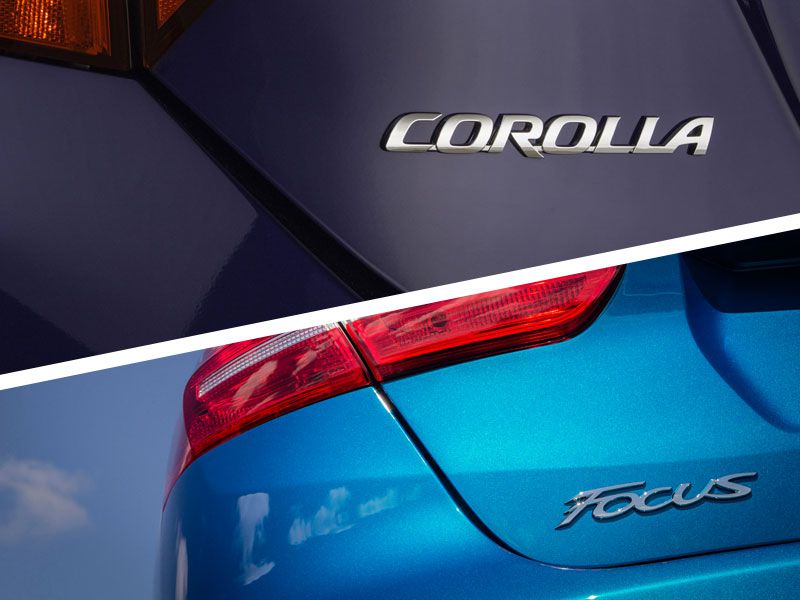
Photo by Ford / Toyota
Focus vs. Corolla: Options
In the Titanium trim, the Focus has nearly everything, with many features available as options in the other trims. So there’s the possibility of a sunroof, 17-inch alloy wheels, a navigation system, a heated steering wheel, an upgraded Sony audio system and a self-parking feature.
The Corolla also offers a sunroof, navigation and a better-than-basic audio system, but that’s about it. The Focus wins this round quite convincingly by providing all those extra choices.
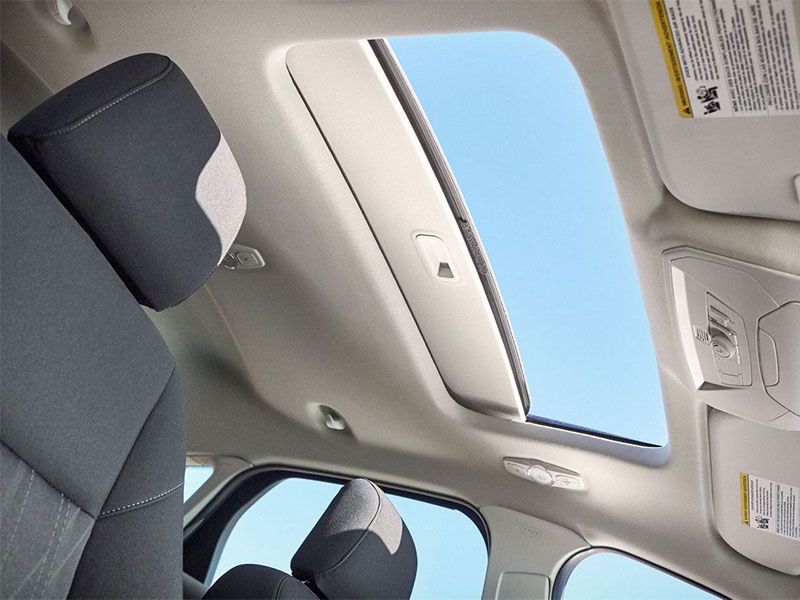
Photo by Ford
Focus vs. Corolla: Powertrains
The main engine for these Focus models is a 2.0-liter four-cylinder unit delivering 160 hp and 146 lb-ft of torque. The standard transmission is a five-speed manual, with a six-speed automatic as the two-pedal option. An alternative for the SE trim is a turbocharged 1.0-liter three-cylinder engine with a stop/start feature, good for 123 hp and 125 lb-ft. Its standard manual transmission has six ratios, or there’s the automatic.
Most Corollas use a 1.8-liter four-cylinder engine producing 132 hp and 128 lb-ft of torque. An LE Eco model is tweaked to provide 140 hp and 126 lb-ft of torque. Toyota deploys a continuously variable transmission (CVT); a six-speed manual transmission is available in the “sporty” SE. Both cars have front-wheel drive.
Advantage Focus.
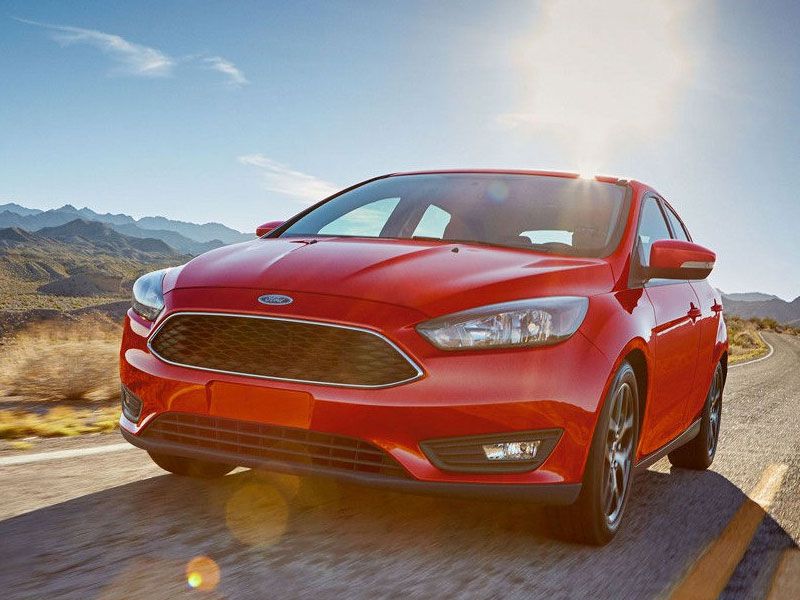
Photo by Ford
Focus vs. Corolla: Fuel Efficiency
The EPA puts fuel consumption for the 2.0-liter engine in the Focus at 25 mpg city, 34 mpg highway and 28 mpg combined with the manual transmission, or 26/38/31 mpg with the automatic. The three-cylinder version returns 30/40/34 mpg (manual) or 27/38/31 mpg (automatic).
The Corolla LE Eco sub-trim achieves 29/38/33 mpg. A regular model with 16-inch wheels and the CVT manages 28/36/32 mpg, and the manual-transmission SE makes 27/35/30 mpg.
Comparing the mainstream automatic models, there’s only one mile per gallon’s difference — in favor of the Corolla.
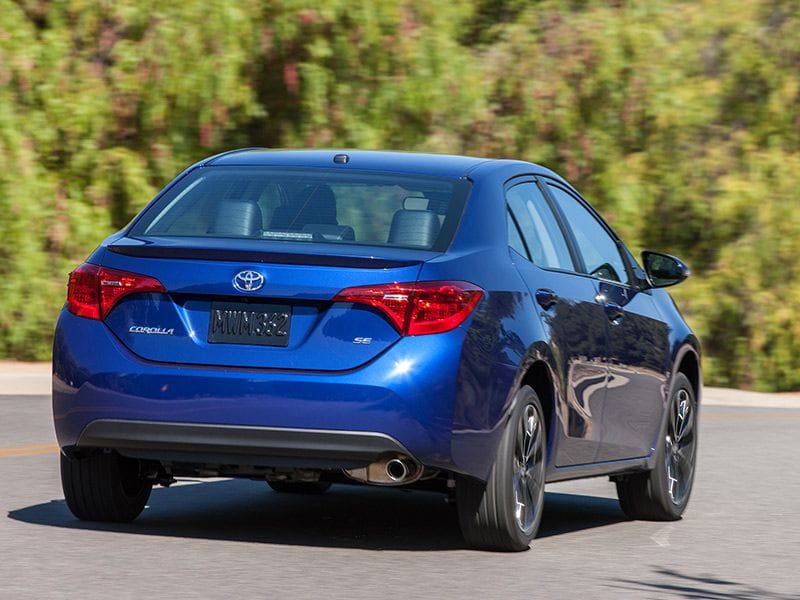
Photo by Toyota
Focus vs. Corolla: Features and Technology
The Focus comes with MyKey, setting limits (like speed and audio volume) for certain drivers. That’s a Ford specialty. It also comes with two USB ports as standard. At SEL level, there’s dual-zone climate control, rear parking sensors, and a configurable instrument cluster. Lane-keeping assistance and blind-spot monitoring with rear cross-traffic alert is also available.
The Corolla only provides one USB port. Its best technology is safety-related, sporting items more often seen in luxury cars. Even the base model has forward collision mitigation with pedestrian detection and automatic emergency braking, active lane-keeping assistance, adaptive cruise control, automatic high beams and a rearview camera.
More toys in the Focus, better safety in the Corolla. Bottom line: Safety beats toys.
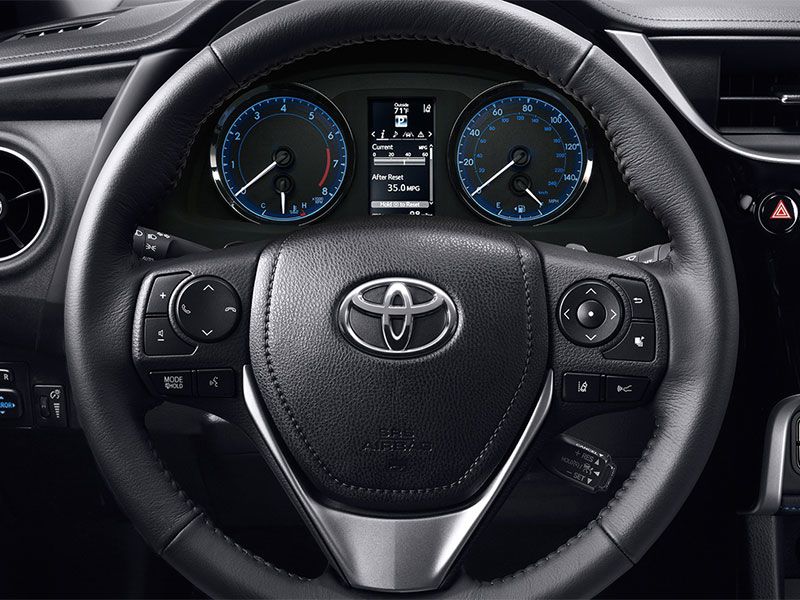
Photo by Toyota
Focus vs. Corolla: Exterior Design
Naturally, this is all a matter of taste. But the Focus is similar to the larger Fusion with a grille so similar to an Aston Martin that it’s a wonder Ford hasn’t at least received some kind of sternly worded letter from the British company. Still, a lot of people like the styling of an Aston Martin. And the Focus comes as a hatchback or sedan, with the former being arguably the better looking.
Conversely, the Japanese car world has hardly contributed many design classics over the years — maybe it’s a culture thing. The Corolla looks vaguely angry. Its grille is too big and the rest of it is borderline forgettable (subjectively speaking, of course). Pin that rosette on the Focus.
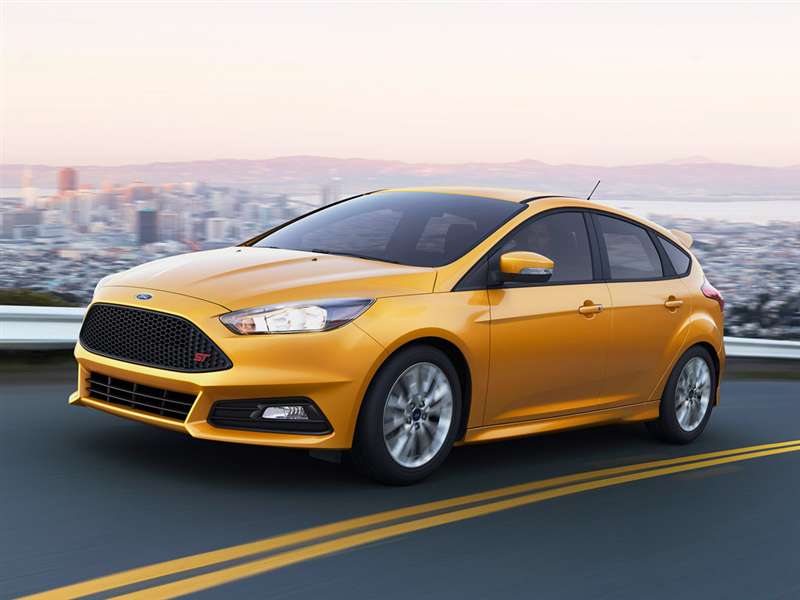
Photo by Ford
Focus vs. Corolla: Interior Design
Over the years, the Focus cabin has perhaps tried a bit too hard to be distinctive. On the other hand, the Corolla has often been utilitarian to a fault. The Focus has now matured into a useful and pleasant cabin, if still somewhat on the busy side. Those who prefer something cleaner and tidier will find plenty to like about the Corolla’s cabin. There aren’t any standout features, but nor are there any wrong notes.
It’s tempting to award this section to the Corolla, but we could live with the Focus. We'll call it a tie.
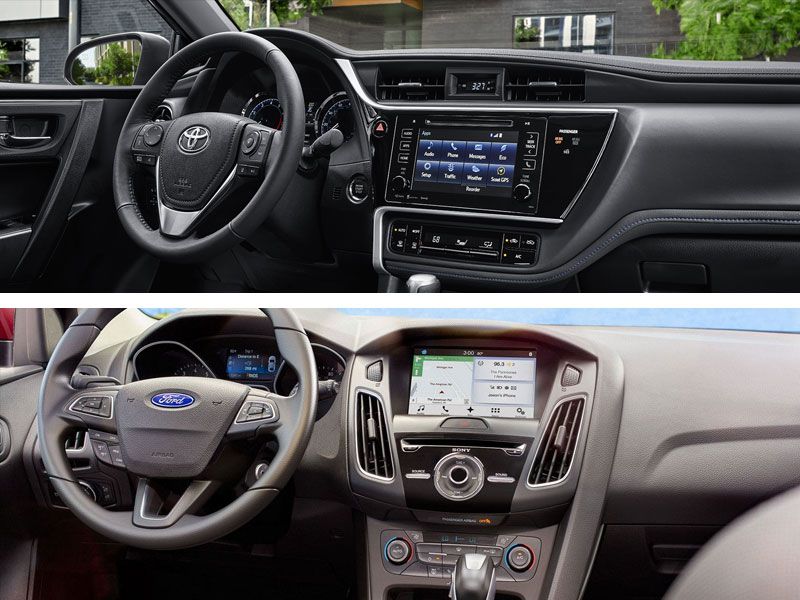
Photo by Ford / Toyota
Focus vs. Corolla: Comfort
Special mention must be made here about the suspension on the Focus. There aren’t many cars that boast the poise and talents to inspire an enthusiast yet still provide comfort levels acceptable to the grouchiest of occupants. The fact that these attributes are in a mainstream compact car is even more impressive. But let’s get to the numbers: 33.2 inches of rear legroom, 38 inches of rear headroom and 90.7 cubic feet of total passenger space.
The Corolla provides a generous 41.4 inches of rear legroom and 37.1 inches of rear headroom, within 97.5 cubic feet of passenger space. It also rides softly, whether the driver wants it to or not.
Disregard the fun factor, and the Corolla takes this one hands-down.
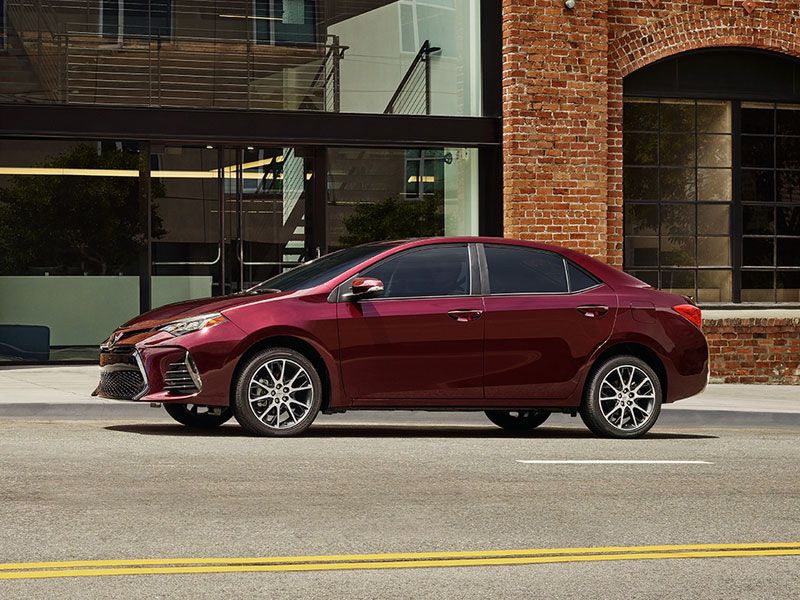
Photo by Toyota
Focus vs. Corolla: Cargo Capacity
The Focus hatchback has an unfair advantage in this respect. By folding down the rear seats, it will present 43.9 cubic feet of cargo space. Keep them in place, and there’s still 23.3 cubic feet behind. The sedan’s trunk enjoys 13.2 cubic feet, which would be acceptable in a midsize car.
The Corolla’s trunk space measures a decent 13 cubic feet. Toyota sells a five-door hatchback called the Corolla iM but it's only loosely related to the Corolla sedan. Any way you slice it, the winner here has to be the Focus.
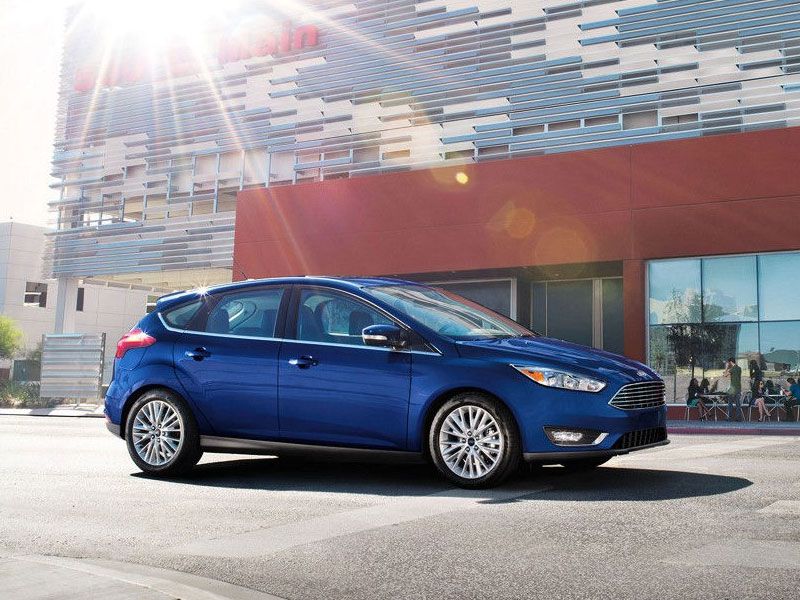
Photo by Ford
Focus vs. Corolla: Safety
Both cars score five out of five stars overall in government crash tests. The independent Insurance Institute for Highway Safety also gives each contender top scores of Good in most categories. An exception is that the Focus takes an Acceptable (second-best) rating in the small-overlap front impact test, while the Corolla manages a Good score in the same situation after a 2017 update.
We’re not impressed that a buyer has to stretch at least to a Focus SE where rear discs are an option (the S has rear drum brakes). And only the SE and XSE Corolla models have rear discs.
The thing that sways us toward the Corolla here is that this model year receives an array of advanced safety features as standard, many of which aren't even offered on the Focus.
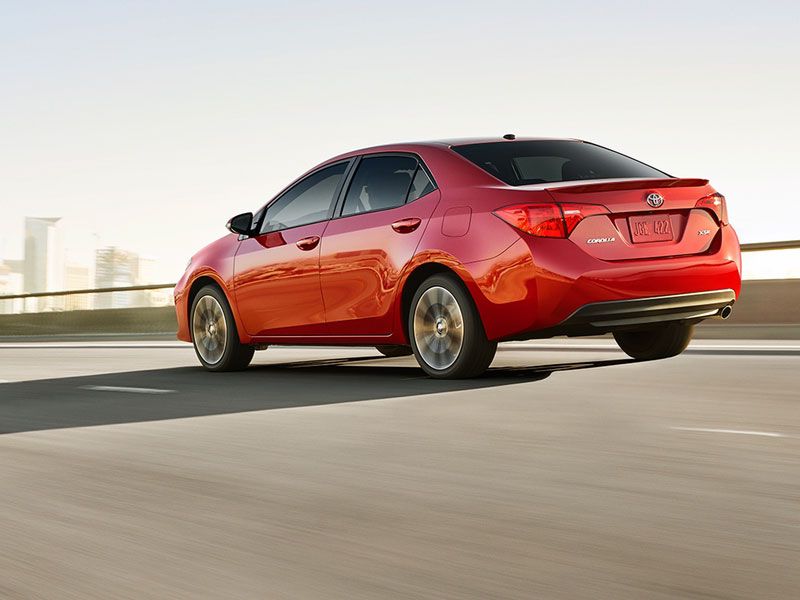
Photo by Toyota